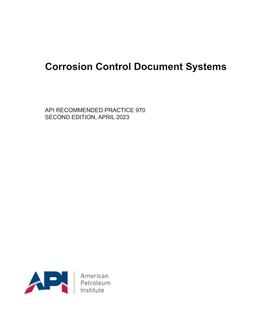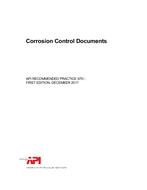PDF Standards API RP 970

PDF Standards API RP 970
This recommended practice (RP) provides users with the basic elements for developing, implementing, and maintaining a Corrosion Control Document (CCD) for refining, and at the owner’s discretion, may be applied at petrochemical and chemical process facilities. A CCD is a document or other repository or system that contains all the necessary information to understand materials damage susceptibility issues in a specific type of operating process unit at a plant site.
CCDs are a valuable addition to an effective Mechanical Integrity Program. They help to identify the damage mechanism susceptibilities of pressure containing piping and equipment, factors that influence damage mechanism susceptibilities, and recommended actions to mitigate the risk of loss of containment or unplanned outages.
This RP serves as the basis for tracking CCD development, implementation, and maintenance to maintain consistency and to integrate the CCD work process with other plant integrity programs, such as Management of Change (MOC), Process Hazards Analysis (PHA), and Reliability Centered Maintenance (RCM). Some of these programs have significant overlap with the development of CCDs, including Risk-Based Inspection studies (see API RP 580 and RP 581), Integrity Operating Windows (see API RP 584), in-house unit corrosion reviews, circuitization/systemization programs, and similar types of corrosion studies. Development of CCDs can serve as a useful starting point for establishing these programs if they have not been undertaken.
This RP provides the owner/user with information and guidance on the work processes for development and implementation of CCDs for the owners’/users’ process units.
Product Details
- Edition:
- 2nd
- Published:
- 04/01/2023
- Number of Pages:
- 61
- File Size:
- 1 file , 1.3 MB
- Product Code(s):
- C97002, C97002, C97002
- Note:
- This product is unavailable in Russia, Cuba, Syria, North Korea, Ukraine, Belarus, Iran

PDF Standards API RP 970
Click here to purchase
This recommended practice provides users with the basic elements for developing, implementing and maintaining a Corrosion Control Document (CCD) for refining, and at the owner’s discretion, may be applied at petrochemical and chemical process facilities. A CCD is a document or other repository or system that contains all the necessary information to understand materials damage susceptibility issues in a specific type of operating process unit at a plant site.
CCDs are a valuable addition to an effective Mechanical Integrity Program. They help to identify the damage mechanism susceptibilities of pressure containing piping and equipment, factors that influence damage mechanism susceptibilities, and recommended actions to mitigate the risk of loss of containment or unplanned outages.
This recommended practice serves as the basis for tracking CCD development, implementation, and maintenance to maintain consistency and to integrate the CCD work process with other plant integrity programs, such as Management of Change (MOC), Process Hazards Analysis (PHA), and Reliability Centered Maintenance (RCM). Some of these programs have significant overlap with the development of CCDs, including Risk-Based Inspection studies (see API RP 580 and RP 581), Integrity Operating Windows (see API RP 584), in-house unit corrosion reviews, circuitization/systemization programs, and similar types of corrosion studies. Development of CCDs can serve as a useful starting point for establishing these programs if they have not been undertaken.
This recommended practice provides the owner/user with information and guidance on the work processes for development and implementation of CCDs for the owners’/users’ process units.
Product Details
- Edition:
- 1st
- Published:
- 12/01/2017
- Number of Pages:
- 59
- File Size:
- 1 file , 950 KB
- Product Code(s):
- C97001, C97001, C97001
- Note:
- This product is unavailable in Russia, Cuba, Syria, North Korea, Ukraine, Belarus, Iran